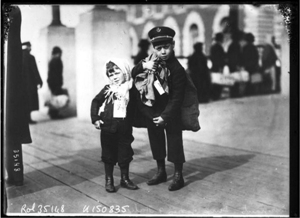DPLA, Europeana Launch Joint Virtual Exhibition Detailing Immigration Connections

Image: Emigrants at Ellis Island – two Italian Children, from Bibliotheque Nationale de France
The Digital Public Library of America (DPLA) and Europeana today announced the official launch of Leaving Europe: A new life in America, a jointly curated virtual exhibition that tells the story of European emigration to the United States during the 19th and 20th centuries.
The exhibition includes digitized photographs, manuscripts, broadsheets, paintings, letters, audio, government documents, and other materials from U.S. and European libraries, museums, and archives, curated to describe the experiences faced by different groups emigrating from Europe to the United States. Officials said that the new project helps showcase the potential for ongoing collaboration between the two digital libraries, as DPLA builds toward the official launch of its online portal in April 2013.
“By combining forces to show how Europeans began new lives in the New World, Europeana and the DPLA have demonstrated a principle that goes far beyond the immediate subject of their exhibition: to build a successful digital future, we must collaborate on an international scale,” Robert Darnton, DPLA Steering Committee member and Carl H. Pforzheimer University Professor and Director of the Harvard University Library, said in an announcement. “The exhibition inaugurates an alliance that will multiply the benefits of the Internet for generation after generation, everywhere in the world.”
Ten institutions worked together to produce the exhibition, which features over 100 rare digitized items, many of which are being made available for the first time. Europeana’s contributing partners included the Bibliothèque nationale de France, the National Gallery of Ireland, the Jewish Museum of London, the Royal Library of the Netherlands, the Saxon State Library and the Norwegian Photo Archives. While DPLA’s contributors included the New York Public Library, Harvard University, The (U.S.) National Archives and Records Administration, and the University of Minnesota Immigration History Research Center.
Key components of DPLA, such as its distributed infrastructure and freely available metadata, have been modeled on precedents set by Europeana, which launched in 2008. Europeana now offers integrated access to over 22 million books, films, paintings, museum objects and archival documents from some 2200 content providers throughout Europe.
“They’ve done a lot of cool stuff in this space, and this was an opportunity for us to learn from them both with regard to linked open data, freely available metadata under a Creative Commons License, but also more specifically on how to make exhibitions that are interesting and appealing to a large range of people,” Kenny Whitebloom, DPLA project coordinator for Harvard’s Berkman Center for Internet & Society, told LJ. “They’ve really honed their process in terms of making exhibitions.”
Bruno Racine, chair of the Europeana Executive Committee, said that he was “delighted” with the results of this first joint initiative between the two groups, “on an eminently trans-Atlantic subject.”
“We share common goals—the free circulation of ideas and knowledge, dedication to the public good, and we believe that the digital revolution opens up unprecedented possibilities for exchanges like this one,” he said in the announcement.
RELATED
ALREADY A SUBSCRIBER? LOG IN
We are currently offering this content for free. Sign up now to activate your personal profile, where you can save articles for future viewing









Add Comment :-
Comment Policy:
Comment should not be empty !!!